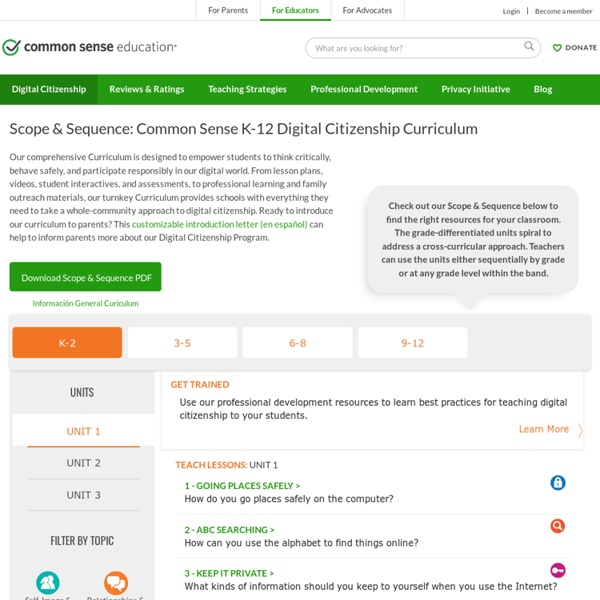Digital Citizenship Week
Ask your students to create their own pledges.How can your students become super digital citizens? Ask them! Begin by encouraging your kids to write their own personal pledges about being good digital citizens in their everyday lives.
Nine Elements
Nine Themes of Digital Citizenship Digital citizenship can be defined as the norms of appropriate, responsible behavior with regard to technology use. 1.
What New Research on Teens and Social Media Means for Teachers
As teachers, we all have assumptions -- and likely some opinions -– about teenagers and social media. But are those assumptions correct? Well, now we have research to help us find out. This week, Common Sense is releasing its latest research report, Social Media, Social Life: Teens Reveal Their Experiences, a deep dive into the social media habits of American teenagers.
3 Digital Reading Challenges for Summer
This summer, more than ever, how we read may be just as important as what we read. In April, researchers at West Chester University published a report arguing that eReaders could lead to decreased comprehension and fluency. In this New York Times article, the professors suggest that the interactivity, easy access to a dictionary, and constant use of text-to-speech could actually hinder the development of students' reading skills. However, the examples highlighted in the article focus on the content -- comparing traditional, paper-based books to electronic versions with a high level of interactivity such as games and video -- rather than addressing the skills and strategies implemented in the reading process. As I wrote in a previous post, students now have the potential to customize their reading experiences with mobile devices. So this summer, instead of reading in whatever manner you would traditionally use, I'd like to suggest three digital reading challenges.
Educational Technology and Mobile Learning: 10 Great Digital Citizenship Lessons from Google
July 15, 2014 Today I want to draw your attention to these excellent resources from Google. These are 10 interactive lessons designed by the folks in Google to help students learn more about different themes related to the general topic of digital citizenship. And while all these lessons revolve around YouTube, most of the principles they include could also be projected on any other digital platform. Using these lessons, teachers and students will be able to gain useful skills and a holistic understanding about responsible digital citizenship, not only on YouTube, but in all online activity. Below is a list of lessons, and the recommended flow for delivery.
Teaching Students Good Digital Citizenship
Teachers have long understood the importance of instilling good citizenship in their students, focusing on social etiquette and how to treat their peers with respect in the course of their daily lives. Today, though, it’s just as important that students understand what kinds of behaviors are acceptable online. Instilling the principles of good digital citizenship can help students become smart, responsible, and respectful members of their online communities.
The Optimistic Heart of Digital Citizenship
Contributed by Renee Hobbs Let’s be frank: there’s a right way and a wrong way to teach digital citizenship. When people hear the term, digital citizenship, most people think of helping students to protect their privacy and be aware of their digital footprint.
Educational Technology and Mobile Learning: Excellent Web Tools and iPad Apps to Enhance Students Reading Comprehension
May , 2014 Reading is one of the basic literacy skills that has been the focus of all pedagogic approaches to literacy. From the " return to the basics" to "multiliteracies", all of these movements have put huge premium on teaching reading skills with each one of them viewing it from a different angel. Traditional didactic literacy pedagogies , as Kalantzis and Cope argued in their wonderful book "Literacies", drew heavily on synthetic approach to learning to read. This approach stresses the importance of learning to read the written word with sound -letter correspondences, or the ways in which the sounds of speaking are transcribed in alphabetical writing. What is worth noting here, however, is that any of these approaches per se is not enough to provide answers to the reading problems early readers face while learning to read. A combination of these approaches into an encompassing literacy framework is more likely to meet students reading needs.
Digital citizenship / Teaching
Netsafe – Learn Guide Protect The myLGP website supports the Learn Guide Protect Framework . The site promotes a student-centred approach to teaching and learning about cybersafety and digital citizenship across the curriculum. Developed by NetSafe, in collaboration with New Zealand teachers. NetSafe kit for schools
Media Literacy: Five Ways Teachers Are Fighting Fake News
As the national attention to fake news and the debate over what to do about it continue, one place many are looking for solutions is in the classroom. Since a recent Stanford study showed that students at practically all grade levels can’t determine fake news from the real stuff, the push to teach media literacy has gained new momentum. The study showed that while students absorb media constantly, they often lack the critical thinking skills needed to tell fake news from the real stuff.



